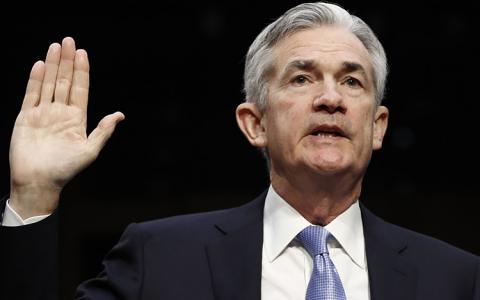
The Federal Reserve on Wednesday upgraded its expectations for the U.S. economy.
As my colleague Brian Cheung notes: "In its updated Summary of Economic Projections, the FOMC now expects the unemployment rate to tilt down to 4.5% by the end of this year with inflation reaching 2.2%. Three months ago, the Fed expected an unemployment rate of 5.0% by the end of 2021 with inflation missing 2% until 2023."
GDP growth is also expected to hit 6.5% this year, up from projections of 4.2% just three months ago.
But with this upgraded outlook for growth and inflation, the Fed's latest interest rate forecast still suggests there will be no rate hikes before the end of 2023. Economist Neil Dutta called this a continuation of the Fed's "passive easing" of monetary policy.
And so simply put, the Fed does not believe any pricing pressures in the economy will warrant a change in its interest rate policy for the next three years.
To help explain this thinking, Fed Chair Jay Powell cited dinner norms in his press conference on Wednesday afternoon.
"There very likely will be a step-up in inflation as March and April of last year drop out of the 12-month window, because they were very low inflation numbers," Powell said. "Those will be a fairly significant pop in inflation, but those will wear off quickly because [of the way] the numbers are calculated."
"Past that," Powell added, "as the economy re-opens, people will start spending more. You can only go out to dinner once per night, but a lot of people can go out to dinner. And they're not doing that now, they're not going to restaurants, they're not going to theaters...and travel, and hotels, that part of the economy is really not functioning at full capacity." (Emphasis ours.)
And while the Twitter commentariat had fun with Powell's exact phrasing — apparently the kind of person who watches the entirety of a Fed press conference is also a multiple-dinner enthusiast — the point the Fed chair makes is economically sound.
The anticipated increase in growth, inflation, and a recovery in the labor market is all part of a one-time recovery story in the U.S. economy. A demand surge against stressed supply chains or understaffed restaurants and bars that results in higher prices this year will not last.
The dinner is a metaphor.
No one thinks the economy will grow at 6% for years to come. No one thinks the 7 million or 8 million jobs added back to the economy this year will be repeated next year. And Powell does not think any inflation pressures that result from this unlocking of activity will re-set the current inflation regime.
Later in the same answer, Powell added, "[Inflation regimes] tend to change over time, and they tend to change when the central bank doesn't understand that having inflation expectations anchored at 2% is the key to it all."
If you look at 5-year/5-year inflation expectations — which measures inflation expectations over the next 5 years starting 5 years from now — we see they are at exactly 2%. Powell referred to current inflation expectations as "well-anchored" on Wednesday.
And while these expectations have increased notably over the last several months, Powell's comments today make clear the Fed sees this rise merely as a return to levels the central bank wants to prevail over the long-term.
The kind of inflation dynamics that would concern the Fed are those which result in material changes in inflation expectations.
Were these expectations to fall too far below 2%, the central bank would worry that businesses and households will delay spending today in hopes of lower prices tomorrow. Conversely, were expectations to rise too far above 2% policymakers would worry about rapid spending today due to fears over higher prices tomorrow.
And just as hot inflation readings in the coming months will be the result of depressed readings during the depths of the recession, so too is the recent rise in inflation expectations just the sunsetting of a depressed outlook shaped by the pandemic.
As Powell said Wednesday, "The economy is a long way from our employment and inflation goals, and it is likely to take some time for substantial further progress to be achieved."
This article originally appeared on Yahoo! Finance.



